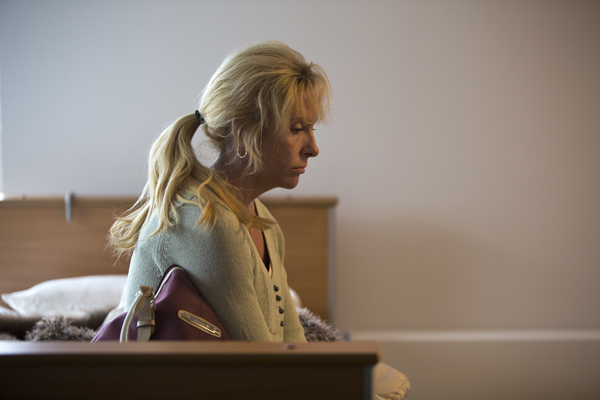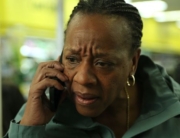Framed by a doorway, a young man in darkness seems to hold back from moving forward into the next room—he’s so still I wondered if the film had stalled. The lead character in Gerard Barrett’s Glassland often hesitates to move onward, with good reason. His mother is an incorrigible alcoholic on a slow-motion death train, and he’s afraid of what he’ll find.
The drama seeks to evoke the frustration, fear, and pain of living with an addict, but incoherent shifts in plot and emphasis diminish its potential impact. Like its tight-lipped protagonist, the film hangs back from making the hard, uncompromising statement it gropes for.
John (Jack Reynor) lives at home and drives a taxi in suburban Ireland. He seems like a kind young man, but constant anxiety keeps him on ice. After rushing his mother (Toni Collette) to the hospital after a near-fatal binge, John tends to a neglected brother with Down syndrome and wiles away the hours with a feckless buddy. All the while, John’s got Mum on his mind. What to do? Reynor won a Sundance Special Jury Award for his performance, and he certainly makes John’s misery palpable.
The family’s travails plunge us into a setting well known to indie filmgoers. Let’s call it the British Isles Wet Woolens Revue: a gray blur of chilly council houses, dingy curtains, inarticulate feelings, and lumpy food pushed around on unwashed dishes. Scenes read so darkly you can barely make out the action, even in typically overlit places like hospitals and shopping malls. Characters often appear in standing still in silhouette, which can either be a statement about the opaque immobility of their lives or an indie gimmick, depending how you look at it.
Collette’s character first appears as a hopeless wreck on the edge of death, puking in her bed and tottering near collapse. But Mum’s still has fiery charisma and sex appeal. Don’t most drunks in the movies? In a slow-moving film heavy with emotional repression, Mum gets to cut loose throwing temper tantrums (and plates), dancing sexily to Soft Cell’s “Tainted Love,” and letting it all hang out with a long, bitter monologue tracing her downfall.
This intended tour de force includes lines such as “You have no idea how much life changes when you bring a life into the world… the joy, the pain, the responsibility. Your life is never the same… And there I was, John, at 27, alone!” Because Collette’s delivery is raw and harsh, the speech is supposed to be an honest breakthrough, the antithesis of Oscar bait. Because it explains Mum’s descent so explicitly and generically, it feels like Oscar bait anyway. Thus, Glassland fights with its own pure intentions.
According to interviews, Collette was only on the set for five days. Perhaps that explains why after a cathartic scene where John finally blows up in rage at his mother, the star basically disappears from the movie. The film starts to cast a hazy eye at other things, which may include loan sharking and sex trafficking. Possibly also organ sales, if a dead body in a bathtub (like something out of a Hammer Film) is any indication. It’s actually pretty hard to tell what’s going on by the end.
Glassland starts as a taut tale of suffering in the kitchen-bunghole mode, becomes a star vehicle in the middle, and winds up as a series of mysteries with no grounding or resolution. No wonder its young protagonist looks stumped. He’s not alone.

















Leave A Comment